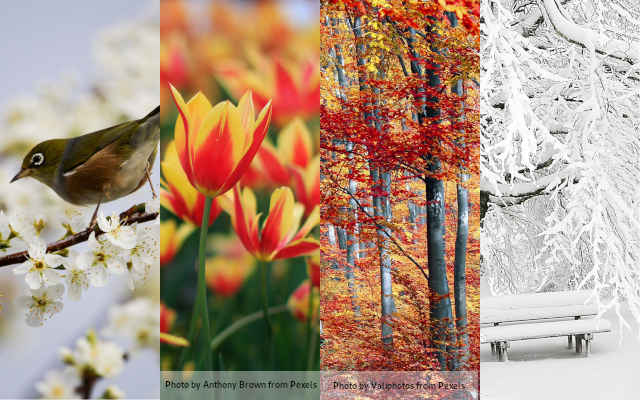The change of seasons
As I’m sitting here, typing away on my computer keyboard, it’s now the waning days of summer and I’m starting to reach for my warmer clothing. But when do they change? Here, in the Paris time zone, the seasons change this year as follows:
- ◆ Spring: March 20, 2020
- ◆ Summer: June 20, 2020
- ◆ Fall: September 22, 2020
- ◆ Winter: December 21, 2020
Seasons according to the astronomers
The astronomical definitions of the seasons are as follows:
Spring: begins when the day and night length are both exactly 12 hours long (the equinox), because the Earth’s tilt is neither north-pole-closer-to-the-sun, nor north-pole-farther-from-the-sun (than the south pole). Sunrise will be exactly from the east, which is where the name for Easter comes from. (Although the religious holiday of Easter is calculated with a special formula, not exactly the same as the start of Spring figured astronomically.)
By carefully measuring the tilt of the Earth’s axis, we can get an exact time for the beginning of spring, not just a date — although this change happens simultaneously for everyone around the world, it’s the time and date that’s different for different cities, so they may recognize different times and dates for the beginning of spring.
Summer: astronomically, it begins here when the angle of the Earth’s tilt is the most tilted in the direction of the north-pole-closer-to-the-sun. The days are the longest in length, and the nights shortest. The apparent path of the Sun through the sky is at it’s highest (angle above the horizon), called the solstice because the Sun stops rising higher and higher each day and starts moving lower again. This is when the land and sea get the most sunlight, but it takes about a month for the heat to set in. (In the Southern hemisphere it works the same way, but of course it happens when the south-pole-is-closer-to-the-sun.)
Fall or Autumn: like spring, it begins when the Earth’s tilt has neither pole tilted closer to the sun. Since the day and night are again of equal length, this is also called an equinox.
Winter: it begins when the poles are tilted opposite to that of the first day of summer. It marks the shortest day and longest night of the year. The apparent path of the Sun through the sky would be at its lowest on this day, but would stop and reverse direction on subsequent days, so it is also a solstice. This days was revered in many ancient cultures as the day when days would stop getting shorter and start getting longer again — celebrating a renewal of warmth and life to come.
The problem
Now if winter is supposed to begin on December twentysomething, why is the coldest month in January or February? Even though the days are the shortest on the first day of winter, there is still some warmth left from the Fall and Summer previous. It takes weeks for that residual heat to wear off. So the coldest part of winter is not the first day, when the Sun is at its most feeble, but later (could be weeks or even a month). The opposite, of course, is true for summer.
Where I live, we had a very warm August — except for the last two days. Then it suddenly got colder, and the building management turned on the heating system. Although we are still within the definition of summer, it didn’t feel like summer.

The Australian solution
In France, the seasons always change as follows:
- ◆ Spring: begins on March twentysomething
- ◆ Summer: begins on June twentysomething
- ◆ Fall: begins on September twentysomething
- ◆ Winter: begins on December twentysomething
But in Australia, they have a different schedule (remember they’re in the Southern Hemispere so the seasons are the opposite of France):
- ◆ Fall: begins on March first
- ◆ Winter: begins on June first
- ◆ Spring: begins on September first
- ◆ Summer: begins on December first
How did they accomplish that? They simply passed a law. The seasons may not match up with the equinoxes and solstices any more, but it tends to get all the warmest days in summer where they belong, and so on.
I’d like to see the season beginnings ALL moved to the first of the month, worldwide.
